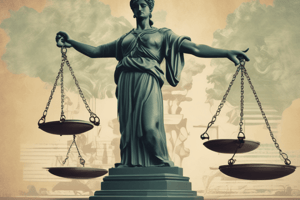Podcast
Questions and Answers
What is the primary objective of the Code of Civil Procedure (CPC)?
What is the primary objective of the Code of Civil Procedure (CPC)?
- To increase the number of civil cases heard by courts
- To ensure justice is administered fairly and expeditiously (correct)
- To eliminate the need for written pleadings
- To provide a platform for criminal proceedings
Which of the following is NOT a common section found in the CPC?
Which of the following is NOT a common section found in the CPC?
- Pleadings
- Trial processes
- Preliminary provisions
- Criminal proceedings (correct)
What type of jurisdiction relates to the authority of a court over specific geographical areas?
What type of jurisdiction relates to the authority of a court over specific geographical areas?
- Clerical jurisdiction
- Subject matter jurisdiction
- Personal jurisdiction
- Territorial jurisdiction (correct)
Which statement best describes the process of discovery in civil procedure?
Which statement best describes the process of discovery in civil procedure?
What is the purpose of an appeal in the context of the CPC?
What is the purpose of an appeal in the context of the CPC?
What defines the formal written statements made by parties regarding their claims and defenses in civil litigation?
What defines the formal written statements made by parties regarding their claims and defenses in civil litigation?
Which principle ensures that all parties have a fair opportunity to present their case?
Which principle ensures that all parties have a fair opportunity to present their case?
How does the CPC adapt to changes in law and society?
How does the CPC adapt to changes in law and society?
Flashcards are hidden until you start studying
Study Notes
Overview
- The Code of Civil Procedure (CPC) regulates the process of civil litigation.
- It establishes rules and procedures for civil courts to ensure fair handling of cases.
Key Concepts
-
Objectives of CPC
- Ensure justice is administered fairly and expeditiously.
- Provide a framework for the enforcement of civil rights.
-
Structure of CPC
- Typically divided into sections and rules covering various aspects of civil procedure.
- Common sections include:
- Preliminary provisions
- Jurisdiction
- Commencement of proceedings
- Pleadings
- Discovery and disclosure
- Trial processes
- Judgment and appeals
-
Jurisdiction
- Defines the authority of courts to hear specific types of cases.
- Includes territorial jurisdiction, subject matter jurisdiction, and personal jurisdiction.
-
Commencement of Civil Cases
- Lawsuits initiated by filing a complaint or petition.
- Requirements for proper filing, including parties involved and claims made.
-
Pleadings
- Formal written statements of parties’ respective claims and defenses.
- Must adhere to certain formats and rules (e.g., specificity and relevance).
-
Discovery
- Process for parties to gather evidence prior to trial.
- Includes depositions, interrogatories, and document requests.
-
Trial Process
- Guidelines on how trials are conducted.
- Involves presentation of evidence, witness examination, and jury instructions (if applicable).
-
Judgments and Appeals
- Courts issue judgments that resolve disputes.
- Parties may appeal judgments based on legal grounds (e.g., procedural errors, misinterpretations of law).
-
Enforcement of Judgments
- Procedures to enforce court orders.
- Includes mechanisms for collection of monetary damages or compliance with other court directives.
-
Amendments and Updates
- CPC is subject to amendments to adapt to changes in law and society.
- Regular updates to procedural rules may occur, impacting litigation strategies.
Important Principles
- Due Process: Ensures that all parties have a fair opportunity to present their case.
- Precedent: Courts often follow previous decisions in similar cases to ensure consistency.
- Equity and Flexibility: CPC may allow courts to apply equitable relief when remedies at law are insufficient.
Conclusion
- The Code of Civil Procedure is fundamental for the proper administration of justice in civil cases, establishing the framework within which civil litigation is conducted. Understanding its provisions is crucial for anyone involved in civil law.
The Code of Civil Procedure
- Regulates civil litigation procedures to ensure fair and efficient handling of cases.
- Provides a framework for enforcing civil rights.
- Typically divided into sections and rules, covering various aspects of civil litigation.
- Common sections include preliminary provisions, jurisdiction, commencement of proceedings, pleadings, discovery and disclosure, trial processes, judgment and appeals, and enforcement of judgments.
Jurisdiction
- Defines the authority of courts to hear specific types of cases.
- Includes territorial jurisdiction (geographic area), subject matter jurisdiction (types of cases a court can hear), and personal jurisdiction (court’s power over the parties involved).
Commencement of Civil Cases
- Lawsuits are initiated by filing a complaint or petition.
- Proper filing requires:
- Identifying the parties involved.
- Clearly stating the claims made.
Pleadings
- Formal written statements outlining each party's claims and defenses.
- Must adhere to specific formats and rules, including:
- Specificity: Providing detailed information.
- Relevance: Using information that directly relates to the case.
Discovery
- Process for parties to gather evidence before trial.
- Methods include:
- Depositions: Oral questioning under oath.
- Interrogatories: Written questions requiring written answers.
- Document Requests: Requests for production of relevant documents.
Trial Process
- Guidelines for how trials are conducted, incorporating:
- Presentation of evidence.
- Witness examination.
- Jury instructions (if applicable).
Judgments and Appeals
- Courts issue judgments to resolve disputes.
- Parties may appeal judgments based on legal grounds, such as:
- Procedural errors.
- Misinterpretations of law.
Enforcement of Judgments
- Procedures to enforce court orders, including:
- Collection of monetary damages.
- Ensuring compliance with court directives.
Amendments and Updates
- The CPC is amended to adapt to legal and societal changes.
- Regular updates to procedural rules may impact litigation strategies.
Important Principles
- Due Process: Guarantees that all parties have a fair chance to present their case.
- Precedent: Courts often follow previous decisions in similar cases for consistency.
- Equity and Flexibility: The CPC can allow courts to apply equitable relief when remedies at law are insufficient.
Studying That Suits You
Use AI to generate personalized quizzes and flashcards to suit your learning preferences.




